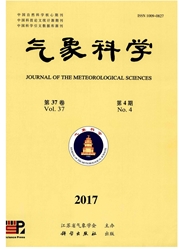

 中文摘要:
中文摘要:
利用耦合了CLM3.5陆面模式的区域气候模式Reg CM4.0,通过敏感性试验,探讨了人为减小春季初始土壤体积水含量对短期时间尺度东亚夏季气候模拟的可能影响。结果表明:较低的初始土壤湿度场能够明显改变区域的地表能量平衡,引起地表净长波辐射和感热通量的显著增加,进而加强了地表对大气的加热,因而引起东亚大范围地区特别是中国东部、印度北部和中亚地区地表温度、气温的升高。与气温不同,初始土壤湿度场对降水的影响很小而且有较大的不确定性,同时偏暖的下垫面使得对流层中高层出现暖高压异常,但这些影响均不显著。综合来看,土壤湿度初始场的初始异常,对Reg CM4.0模式东亚气候模拟的结果有一定影响,特别是在地表温度、气温和能量平衡方面,应在以后的模拟中加以考虑。
 英文摘要:
英文摘要:
The regional climate model RegCM4.0 coupling with a land surface model CLM3.5 was used to investigate the possible impacts of initial soil moisture anomalies on East Asian summer climate by idealized sensitivity experiments in short-term scale. Results suggest that large-scale initial soil moisture anomalies can alter the surface energy balance and cause evident increase of net surface long-wave radia- tion and sensible heat flux, as well as intensify surface thermal heating to the atmosphere. Meanwhile, low initial soil moisture anomalies can lead to a significant warming effect in both surface and air temperature over East China, North India and Central Asian. Unlike temperature, the impact of initial soil moisture anomalies on precipitation is insignificant and has large uncertainties, even if warmer underlying sur-face causes abnormalities of warm high pressure in middle and upper tropospheres, but these effects were not obvious. Overall, the initial soil moisture anomalies have a certain impact on the climate simulation results of RegCM4.0 in East Asia, especially on the temperature and energy flux, which should be considered in simulation in the future.
 同期刊论文项目
同期刊论文项目
 同项目期刊论文
同项目期刊论文
 期刊信息
期刊信息
